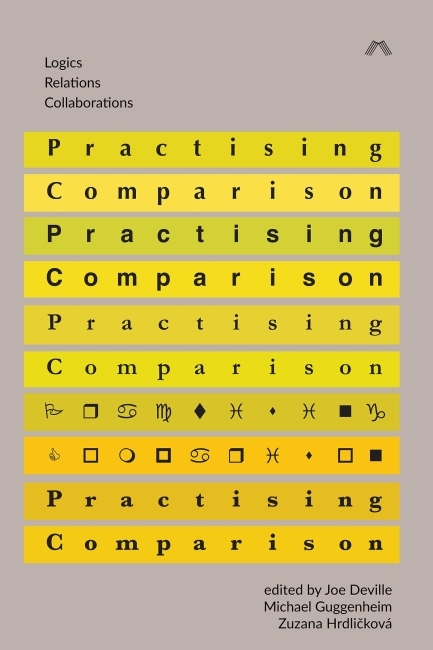
Practising Comparison: Logics, Relations, Collaborations
Edited by Joe Deville, Michael Guggenheim and Zuzana Hrdličková
Published: July 2016
– Buy paperback (£15) – delivery time approximately 1 week (not the longer timelines currently displayed on Amazon)
– Download pdf (Mattering Press is a registered charity. For those who can, please consider making a donation to support the press)
– ePub, Mobi, and HTML versions available shortly
A new collection that analyses how exactly comparison — as a particular type of social scientific practice — is done, while assessing some of its opportunities and limitations. It features case studies of comparative practices that range from colonial architecture, to hacking communities, to ranking practices in hospitals and academia, while also examining the practical challenges of achieving comparison. This might include the need to collaborate in teams or to stretch comparisons across time and space.
Overview
This book compares things, objects, concepts, and ideas. It is also about the practical acts of doing comparison. Comparison is not something that exists in the world, but a particular kind of activity.
Agents of various kinds compare by placing things next to one another, by using software programs and other tools, and by simply looking in certain ways. Comparing like this is an everyday practice. But in the social sciences, comparing often becomes more burdensome, more complex, and more questions are asked of it.
How, then, do social scientists compare? What role do funders, their tools and databases play in social scientific comparisons? Which sorts of objects do they choose to compare and how do they decide which comparisons are meaningful? Doing comparison in the social sciences, it emerges, is a practice weighed down by a history in which comparison was seen as problematic. As it plays out in the present, this history encounters a range of other agents also involved in doing comparison,who may challenge the comparisons of social scientists themselves.
This book introduces these questions through a varied range of reports, auto-ethnographies, and theoretical interventions that compare, and analyse these different and often intersecting comparisons. Its goal is to begin a move away from the critique of comparison and towards a better comparative practice, guided not by abstract principles, but a deeper understanding of the challenges of practising comparison.
Table of contents
1. Introduction: The practices and infrastructures of comparison
Joe Deville, Michael Guggenheim and Zuzana Hrdličková
2. Comparative research: Beyond linear-causal explanation
Monika Krause
3. Cross comparison: Comparisons across architectural displays of colonial power
Alice Santiago Faria
4. Same, same but different: Provoking relations, assembling the comparator
Joe Deville, Michael Guggenheim and Zuzana Hrdličková
5. Pulling oneself out of the traps of comparison: An autoethnography of a European project
Madeleine Akrich and Vololona Rabeharisoa
6. Frame against the grain: Asymmetries, interference and the politics of EU comparison
Tereza Stöckelová
7. Lateral comparisons
Christopher Gad and Casper Bruun Jensen
8. Comparative tinkering with care moves
Peter Lutz
9. Comparing comparisons: On rankings and accounting in hospitals and universities
Sarah de Rijcke, Iris Wallenburg, Paul Wouters and Roland Bal
10. Steve Jobs, terrorists, gentlemen and punks: Tracing the strange comparisons of biohackers
Morgan Meyer
11. Afterword: Spaces of comparison and conceptualisation
Jennifer Robinson